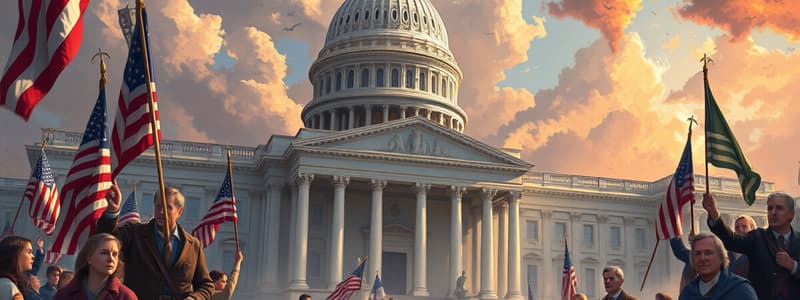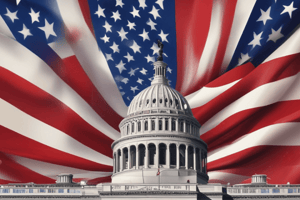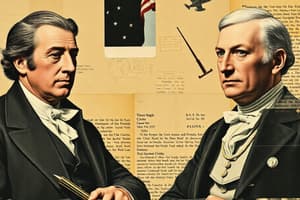Podcast
Questions and Answers
What is Chapter 1: The Study of American Government?
What is Chapter 1: The Study of American Government?
The introductory chapter covering foundational concepts of American government.
What is Legitimacy?
What is Legitimacy?
Political authority conferred by law or by a state or national constitution.
What is Authority?
What is Authority?
The power or right to give orders or make decisions.
What is Democracy?
What is Democracy?
What is Political Elite?
What is Political Elite?
What is Direct Democracy?
What is Direct Democracy?
What is Representative Democracy?
What is Representative Democracy?
What is Bureaucratic Theory?
What is Bureaucratic Theory?
What is Power Elite Theory?
What is Power Elite Theory?
What is Pluralist Theory?
What is Pluralist Theory?
What is Marxist Theory?
What is Marxist Theory?
What does Unalienable mean?
What does Unalienable mean?
Who were the Federalists?
Who were the Federalists?
What are the Articles of Confederation?
What are the Articles of Confederation?
Who were the Anti-Federalists?
Who were the Anti-Federalists?
What is the Declaration of Independence?
What is the Declaration of Independence?
What are The Federalist Papers?
What are The Federalist Papers?
What was the Constitutional Convention?
What was the Constitutional Convention?
What is the Separation of Powers?
What is the Separation of Powers?
What was Shays's Rebellion?
What was Shays's Rebellion?
Flashcards are hidden until you start studying
Study Notes
Chapter 1: The Study of American Government
- Legitimacy refers to political authority derived from law or a constitution.
- Authority is the power to give orders or make decisions within a political system.
- Democracy is a political system where citizens hold supreme power and elect representatives.
- Political elite consists of a disproportionately powerful group, often activists, who wield significant political influence.
- Direct democracy allows citizens to rule directly without intermediaries; representative democracy involves electing leaders to make decisions.
Political Theories
- Bureaucratic theory emphasizes the real power held by bureaucrats due to government structures and procedures, as proposed by Max Weber.
- Power elite theory posits that a small group of wealthy individuals, corporate interests, and large financial institutions control major policy areas.
- Pluralist theory suggests that politics is a competition among diverse groups that advocate for their preferred policies.
- Marxist theory, advocated by Karl Marx, argues that government reflects economic forces, notably the ownership of production.
Chapter 2: The Constitution
- Unalienable rights are natural rights that cannot be surrendered or transferred and belong to every individual.
- Federalists, led by Alexander Hamilton and John Adams, supported a strong national government and opposed the inclusion of a Bill of Rights.
- The Articles of Confederation were America's first constitution, adopted in 1781, which gave most power to the states, limiting Congress's authority significantly.
- Anti-Federalists opposed the Constitution due to the centralization of power and the absence of guaranteed individual rights, ultimately leading to the Bill of Rights' passage.
- The Declaration of Independence was proclaimed on July 4, 1776, declaring the colonies' independence from Great Britain.
- The Federalist Papers, authored by John Jay, Alexander Hamilton, and James Madison, were essays that advocated for a strong central government and aimed to persuade New Yorkers to ratify the Constitution.
- The Constitutional Convention in 1787 was convened to revise the Articles of Confederation but resulted in creating the US Constitution.
- The separation of powers is a constitutional principle that divides government responsibilities among legislative, executive, and judicial branches, each with distinct functions.
Shays's Rebellion
- Shays's Rebellion, led by Daniel Shays, was a protest by farmers in Massachusetts (1786-1787) against mortgage foreclosures and illustrated the necessity for a stronger national government, prompting calls for the Constitutional Convention.
Studying That Suits You
Use AI to generate personalized quizzes and flashcards to suit your learning preferences.





